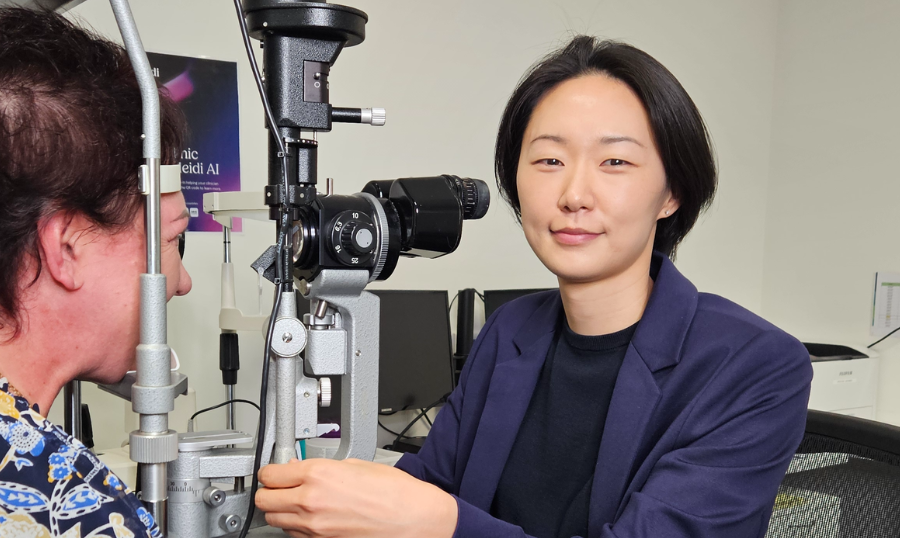Auckland Eye Welcomes Cornea and Anterior Segment Specialist Dr Bia Kim
Auckland Eye is pleased to welcome Dr Bia Kim, a highly trained Cornea and Anterior Segment Specialist, to our team.

Learning difficulties, problems with balance and coordination or issues with sports and physical activities – in children, vision disorders can have serious knock-on effects. Eyesight issues can also be hard to identify, as children won’t necessarily notice that something is wrong.
This means it’s up to parents to watch for signs so they can get treatment promptly. Often, it’s as simple as a prescription for glasses. While no single symptom or sign can confirm a vision problem, if you notice several indicators in your child, it’s a good idea to have their vision checked.
Here’s a look at some common signs:
A frequent squint could indicate that your child is struggling to focus, which may be a sign of astigmatism, hyperopia or myopia. However, just as some children roll their eyes or bite their fingernails, some children squint as a habit, so this is not a definite sign of a vision problem.
Tilting or twisting to read or watch TV can indicate strabismus – a muscle imbalance in the eye. Because the eye may struggle to focus when looking straight ahead, children unconsciously tilt their heads to correct the problem. This can also be a refractive error, a common vision issue that affects the way light enters the retina and causes focus problems.
A short attention span or difficulty focusing isn’t always a behavioural issue. Children with farsightedness tend to quickly lose interest in activities that involve close vision – like games, reading, puzzles or drawing – because it’s difficult for them to focus for long periods. They may even avoid these activities altogether.
While uncommon, a mismatch or an odd reflection of the eye in a photo can be a flag for serious issues. For example, if one eye has ‘red eye’ and the other doesn’t, it could be a sign of an internal problem, like a cataract. In some cases, the affected eye can look yellow, black or white on camera, while the other looks normal. If you notice that your child’s eyes look odd or mismatched in pictures, get them checked by an eye specialist promptly.
Eye issues, particularly misaligned eyes, can reduce depth perception, making it difficult to judge distances and move through space accurately. If you notice your child frequently walking into furniture, falling or knocking things over, this could be the problem.
Frequently rubbing or touching the eyes can be related to allergies or irritation in the eyes. More rarely, it’s a sign of a muscle imbalance or focusing issue that tires the eyes, making them feel fatigued and itchy.
Headaches can be a sign of a focusing issue that causes eye strain. Less commonly, headaches can be a symptom of pressure or swelling behind the child’s eyes. In either case, it’s important to have your child’s eyes tested promptly if they mention headaches frequently.
Children can focus on close objects much more easily than adults, so sitting close to the TV or holding a book close to the face isn’t necessarily a sign of a vision issue. However, if your child is showing this sign along with others, it’s safer to get an eye test.
In New Zealand, children can also have regular eye checks as part of the Well Child-Tamariki Ora program and universal vision screening at the age of 4-5. While these can help pick up eye problems that may have been missed, you don’t need to wait for a scheduled check to have your child’s eyes tested.
If you notice one or more signs of an eye problem in your child, or if you’re concerned about their vision for another reason, book an appointment with your GP or eye specialist as soon as you can. The earlier a vision problem is picked up, the easier it is to treat and the better the outcome for your child.
Book an appointment with us today at admin@aucklandeye.co.nz or call us on 0800 25 53 93.

Auckland Eye is pleased to welcome Dr Bia Kim, a highly trained Cornea and Anterior Segment Specialist, to our team.

Discover how Auckland Eye is redefining inclusive healthcare by launching New Zealand’s first assistive website toolbar.

Macular degeneration is a leading cause of vision loss in older adults. There’s no cure, but its progression can be slowed. Here’s what to know.